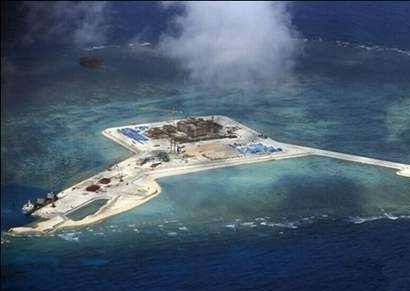By Chen Xiaoguang and Chang Yudi, researcher and intern with the Chongyang Institute for Financial Studies, Renmin University of China.
In a statement on Tuesday,the government of the People's Republic of China said it neither accepts nor recognizes the award of an arbitral tribunal in the South China Sea arbitration established at the request of the Philippines. The statement was issued after The Hague tribunal issued a final verdict of the arbitration of the South China Sea issue, which was unilaterally brought forward by the Philippines.

On July 5, former Chinese State Councilor Dai Bingguo, unmistakably stated at the opening ceremony of the China-US think-tank dialogue on the South China Sea issues held in Washington that "the arbitration will be nothing but a piece of waste paper."
One of the authors was a part of the organizing team for the dialogue and was present when Dai made his statement, which left a huge impact on his American counterparts. After the dialogue, several American media reports focused on Dai's "a piece of waste paper" remark.
Then why does China not accept the arbitration and why did Dai Bingguo call the ruling "a piece of waste paper"?
One of the reasons is that according to international law, the case was illegally brought to an unrecognized tribunal with an incompetent jurisdiction.
Firstly, China's sovereignty and historic rights over South China Sea Islands and the surrounding seas are mandated by law. This legitimacy comes first in "the right of discovery" and "the right of inheritance" quoted from the terms of sovereignty in international law, and China was the first to discover, name and continuously rule South China Sea Islands. This is in keeping with the United Nations Convention on the Law of the Sea (UNCLOS).
Secondly, China's historic right over South China Sea Islands is indicated in the UNCLOS.
Thirdly, according to international treaties such as the Cairo Declaration and the Potsdam Proclamation, coastal countries and extraterritorial countries recognize or used to recognize China's sovereignty over South China Sea Islands. The 1935 Constitution of the Republic of the Philippines explicitly stipulated that the territory of the Philippines was confined to the Philippine Islands and did not include Huangyan Island located at 118 degrees east longitude or any other islands in the South China Sea.
However, some countries including the Philippines forcibly occupied some islands in the South China Sea, negating its former acknowledgement of China's sovereignty over South China Sea and triggering the estoppels of international law. This violated the UN Charter's regulation that forbade acquisition of territory though violence.
Thus, the Philippines has violated international law.
In fact, the launch of the arbitration was illegal. According to the UNCLOS, all member states are subjected to exchange of views for settlement of disputes over the interpretation and application of the UNCLOS and to settlement of conflicts through negotiations and other peaceful means. It is also prescribed that arbitration is an independent choice that should be launched on the basis of bilateral consensus.
According to documents signed by China and the Philippines such as the Declaration on the Code of Conduct on the South China Sea, the Philippines have already chosen to solve the dispute via negotiation.
Yet, according to existing evidence, the Philippines did not communicate fully with China before bringing the arbitration forward. Their notice of arbitration that was handed to China was directly returned.
In 2006, China made an exclusive statement based on the 298th item under the UNCLOS that excludes obligatory settlement of arbitration on disputes over maritime boundary delimitation.
Under such conditions, the Philippines again brought the arbitration case unilaterally, which was without reason and failed to abide by the procedural law.
There are foul aspects in the personnel of the arbitral tribunal. Since China refused to take part in the case, the tribunal appointed one arbitrator to "stand for" China. Yet during the execution, this "representative" of China did not play an independent role or say anything favorable for China, but voted for the Philippines.
Any reasonable observer would question the legitimacy of a tribunal without China.
More importantly, according to the UNCLOS, a tribunal doesn't have jurisdiction on territorial disputes, which makes the Philippines arbitration untenable on a legal basis.
The Philippines purposely bypassed China's sovereignty over the islands within the "dotted line of the South China Sea," and claimed the geographical nature and surrounding waters which is an evident confrontation with "the principle of territorial control".
Territorial sovereignty forms the basis of a country's maritime rights, which is a general principle of international law and also a case law precedent in the 1969 North Sea Continental Shelf Case, the 1978 Aegean Sea Continental Shelf Case and the 2001 Qatar-Bahrain Case.
Territorial sovereignty is beyond the jurisdiction of the UNCLOS. Item 287 and appendix seven of UNCLOS clearly states that the convention does not have jurisdiction on territorial disputes.
The authorities of the Philippines are very clear on this, and they have been very careful with their words.
Yet, the core of arbitrating the island and maritime interests within China's territory is still a territorial dispute that is excluded from any arbitration by law.
The Philippines also put forward the issue of "free navigation" under the hypothetical premise logic that Chinese activities enter into Philippine waters. But the fact is quite the opposite. China and the Philippines haven't demarcated sea areas, and China doesn’t intend to interfere with legal free navigation and flight in its sovereign waters. There's no conflict between protecting free navigation and China's exercise of its sovereignty.
Furthermore, China has built public facilities such as lighthouses to ensure the safety of fairway and free navigation.
And no international judiciary or tribunal could apply the UNCLOS to rule cases regarding disputed territory and to decide the maritime rights to these islands.
However, the tribunal still accepted the case filed by the Philippines, which breached the terms on the jurisdiction of the arbitral tribunal.
Ultimately, international law is not national law, and there's no such thing as "a world government" or "a world policeman", although certain country wants to play this role. The fundamental difference between international law and national law is that it cannot outmatch a country's territory.
Even from a legal perspective, the arbitration loses legal ground as it lacks procedural evidence, legal tribunal personnel, and jurisdiction.
Members of the international jurisprudential circle hold various opinions towards the case, and all admit that the case would be a very special one to be enlisted in the history of international law, but it would also serve as a negative experience from our point of view.
China's rejection of the South China Sea arbitration doesn't mean that China resists international law. On the contrary, refusing an illegal arbitration is the right way to defend the integrity of international law.
( The opinions expressed here do not necessarily reflect the opinions of Panview or CCTV.com. )

Panview offers an alternative angle on China and the rest of the world through the analyses and opinions of experts. We also welcome outside submissions, so feel free to send in your own editorials to "globalopinion@vip.cntv.cn" for consideration.















